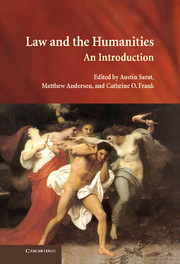Book contents
- Frontmatter
- Contents
- Contributors
- Acknowledgments
- Introduction: On the Origins and Prospects of the Humanistic Study of Law
- I PERSPECTIVES ON THE HISTORY AND SIGNIFICANCE OF SCHOLARSHIP IN LAW AND THE HUMANITIES: THREE VIEWS
- II IDEAS OF JUSTICE
- III IMAGINING THE LAW
- 8 Imagining the Law: The Novel
- 9 Imagining Law as Film (Representation without Reference?)
- 10 Law and Television: Screen Phenomena and Captive Audiences
- 11 Imagining the Law: Art
- IV LINGUISTIC, LITERARY, AND CULTURAL PROCESSES IN LAW
- V INSTITUTIONAL PROCESSES
- Index
- References
8 - Imagining the Law: The Novel
Published online by Cambridge University Press: 20 January 2010
- Frontmatter
- Contents
- Contributors
- Acknowledgments
- Introduction: On the Origins and Prospects of the Humanistic Study of Law
- I PERSPECTIVES ON THE HISTORY AND SIGNIFICANCE OF SCHOLARSHIP IN LAW AND THE HUMANITIES: THREE VIEWS
- II IDEAS OF JUSTICE
- III IMAGINING THE LAW
- 8 Imagining the Law: The Novel
- 9 Imagining Law as Film (Representation without Reference?)
- 10 Law and Television: Screen Phenomena and Captive Audiences
- 11 Imagining the Law: Art
- IV LINGUISTIC, LITERARY, AND CULTURAL PROCESSES IN LAW
- V INSTITUTIONAL PROCESSES
- Index
- References
Summary
The title of this chapter succinctly captures the terms that are in play when we talk about the relationship between the novel and the law. To represent law in the form of the novel is, in the most obvious sense, an act of the imagination, but “to imagine” the law also implies that the law does not exist prior to that act of the imagination, that it has no objective reality outside of the literary or cultural forms that invoke its presence. The implication that the law is not a “thing,” that it endures only because of its discursive and material effects, has wide-reaching and potentially dangerous political and social consequences, not the least of which is the challenge those effects might pose to law's authority. Moreover, specifically representing law in literature might further undermine its authority given the ancient suspicion against poesis (or “making”) as that which threatens the supposedly transcendent and nonhuman source of law's authority (identified either as divine or based on objective reason). At particular historical moments, of course, the social, moral, and aesthetic standing of specific literary genres can either promote or undermine law's authority – thus the high value placed on dramatic representations in antiquity would, when combined with the representation of legal events, reinforce law's privileged status in that culture.
This chapter focuses on the affiliation between the novel and the law, an affiliation that involves a delicate balancing act between the demands inherent in affirming the status of the rule of law and the generic demands of the novel, the most obvious of which is the commonly held assumption that law seeks the “truth,” whereas the novel relies on “fiction.
- Type
- Chapter
- Information
- Law and the HumanitiesAn Introduction, pp. 213 - 240Publisher: Cambridge University PressPrint publication year: 2009
References
- 1
- Cited by

